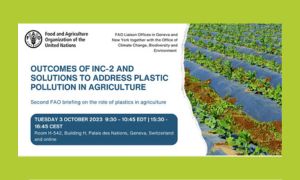

Plastics play a significant role in agriculture, with an annual usage of 12.5 million tonnes encompassing crop and livestock production, forestry, fisheries, and aquaculture. While plastic products can offer advantages such as increased crop yields, reduced water and fertilizer consumption, and improved efficiency in labor and production, their utilization also comes with notable drawbacks. There is a growing body of evidence suggesting that degraded plastics can contaminate soil, negatively impact biodiversity, and harm soil health. Over time, these issues can result in diminished productivity and pose a threat to food security.
In light of the first briefing organised by FAO regarding “FAO and INC-2: the role of plastics used in agriculture,” we are delighted to extend an invitation to a second hybrid briefing organised by the FAO Liaison Offices in Geneva (LOG) and New York (LON), in collaboration with the Office of Climate Change, Biodiversity, and Environment (OCB).
The second briefing will focus on: